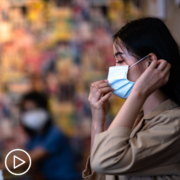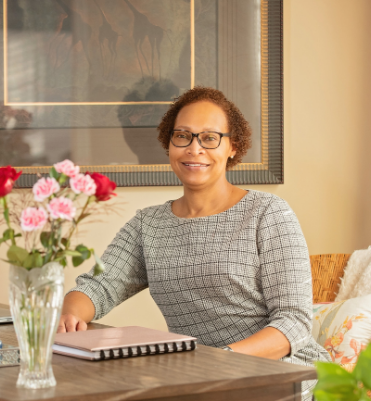Empowered Patient and Care Partner Ask the Expert: Addressing COVID-19 Concerns from Patient Empowerment Network on Vimeo.
With COVID-19 infection and vaccine concerns, what are the key points for cancer patients and care partners to know? Expert Dr. Shaji Kumar from Mayo Clinic shares valuable information about protective measures against COVID-19 infection, vaccine side effects and effectiveness, working toward herd immunity, and cancer research benefits that have emerged from the pandemic.
See More From the Best Care No Matter Where You Live Program
Related Programs:
Transcript:
Mary Leer:
My name is Mary Leer. I’m the Breast Cancer Network Manager.
Jeff Bushnell:
And I’m Jeff Bushnell, the MPN Network Manager at the Patient Empowerment Network. I’m a caregiver.
Dr. Shaji Kumar: I
’m Shaji Kumar, a hematologist at Mayo Clinic.
Mary Leer:
Jeff and I are proud to be part of a strong team of compassionate volunteers, helping health communities adapt to the realities of living with a serious illness, living with cancer during a pandemic certainly presents another layer of challenges. So, Jeff and I will drill down to ask the important questions from the community. For this production, Empowered Patient and Care Partner Ask the Expert, we are very lucky to be joined by noted expert, Dr. Shaji Kumar, a consultant in the division of hematology at Mayo Clinic. Thank you for taking the time to join us, Dr. Kumar.
Dr. Shaji Kumar:
Thank you for having me, Mary.
Mary Leer:
Let’s start with the top of mind questions for so many of us right now, what should every patient and care partner facing a cancer diagnosis know during the pandemic?
Dr. Shaji Kumar:
I think it’s a challenging time for everyone, and it’s obviously more challenging for patients dealing with cancer at the same time, thankfully, we have a vaccine at hand that will certainly make the situation a lot better, but I think from a cancer standpoint, I think what we need to keep in mind all the precautions we talk about in terms of social distancing, masking, hand washing and all those measures apply equally to everyone, even more so to patients with cancer. And the reason why we say that it’s even more important for several reasons, one, and we continue to learn more about the pandemic and its impact on cancer, one thing that has become clear is that patients with underlying conditions including cancer are to other folks were more affected by the infection, more likely to have more severe interactions and poorer outcomes. Now, patients with cancer appear to be at a higher risk of getting the infection and then they get the infection having a more serious disease. Now, it’s hard to know how much of this is also related to the fact that patients with cancer often have to go into the hospital or the clinic, and hence are more likely to get exposed to the infection than someone who is able to just stay at home.
So that’s one thing. And second, we know that the ongoing treatment for cancer definitely suppresses the immune system, and hence places people at a higher risk of the infection itself. Now, even patients who have their past history of cancer, this appears to be some increased risk, even though this is a little bit, unclear how much more it impacts those individuals. But I think the bottom line is keep the awareness that you might be at a higher risk of getting the infection, more serious infection, and the need to take those precautionary measures in a more strict fashion, and getting the vaccination when you can get it is all things that one needs to keep in mind.
Jeff Bushnell:
Well, that’s wonderful, Dr. Kumar, you mentioned the vaccinations, I am a strong proponent of that, I happen to have been involved in the Moderna vaccine trial, which is and still enrolled, they’re doing the follow-up. I guess they’re checking the last time I was in last week, they took 8 vials of blood, I think they’re checking to see whether I have the antibodies and how long it will last, but I was very happy with the way it was conducted, they were very forthcoming with information.
It was very interesting. And out here in San Diego, where I am, we have done pretty well as a county in vaccinating people and Summer got the vaccine as well with myelofibrosis and she feels a lot better. But for cancer patients who have tested positive for COVID, are there notable consistencies amongst that group of people, and have we learned anything from those patients yet about maybe their chances of getting it more, or their reaction to it? That kind of thing.
Dr. Shaji Kumar:
We know that there’s a wide spectrum of reaction to the vaccine. The majority of the people would not notice any symptoms related to that except for some pain at the injection site. Not there are some folks, number of people who might have more or just myalgia, muscle pains, just feeling fatigue, some low-grade fevers, just feeling blah for 24-48 hours, and it seems to be not too uncommon. The reactions to the vaccine in terms of the side effects or the symptoms, there doesn’t appear to be much of a difference between cancer patients and normal individuals. Now, in terms of the efficacy of vaccination, you just mentioned Jeff, about you being checked for the antibodies, obviously, that is something that we hope will happen to all individuals who get the vaccine, but we know that is not going to be the case, there’s going to be a wide variation in terms of how strong an immune response one might develop against vaccines. Now We know from, not necessarily the COVID vaccine, but the vaccinations that have been used in the past, whether it be flu vaccines or pneumococcal vaccines, that we all get patients with cancer or patients going through treatment for cancer that can suppress the immune system, tend to have a lower response. But again, that varies quite widely from patient to patient now, there are some vaccines where we can clearly look at the antibody response and say, “Oh, this is not adequate, and we need to maybe give an extra shot.”
We just don’t have that information for COVID vaccines yet. So the way I would look at it is, even though the response to the back in a given person might be less than what we eventually would identify to be optimal, it’s likely to be better than not having to see the vaccine, so I would encourage obviously, everybody to get the vaccine. Now, what about someone who has already had an infection, what would be the response? Should we vaccinate those people? We certainly should. Again, we don’t know the immunity from a natural infection, how long would that last? That is still something that is unknown, and the vaccination dose is likely to make the responses more relevant and more durable, so I would recommend the vaccines for everyone. We don’t think one vaccine is any different from another in terms of your underlying cancer or lack thereof. So in terms of assessing for the antibodies, there is no clear guideline in terms of what one should anticipate from the vaccine, so there is really no way to say, check the antibody, and they can go ahead and get one more dose or you’re fully vaccinated. So I think the bottom line is, get the vaccine, you don’t need to necessarily test for a response, and then we continue with the usual measures for prevention.
Jeff Bushnell:
And so what would you tell the… I guess that’s pretty much the answer to the next question I had. What would you tell the patients who are in active treatment and who planned to get the vaccine just continue as normal after they get it, with all the appropriate precautions?
Dr. Shaji Kumar:
Yeah, no, I think there’s one other important aspect, Jeff, to that question you just raised, which is, what is the right timing to get vaccinated, the vaccine, and that is a question that often comes up. So patients who are not getting active treatment, there is obviously no concern whenever the name comes up, go ahead and get the vaccine. And the second is what if someone is actually getting active treatment for their cancer, is there any role in terms of trying to find the vaccination, with respect to the doses of the medications and for most of the treatment we are using for cancer, there are no clear guidelines in terms of the when they can get the vaccine, that having several guidelines that have been put out by different organizations. The bottom line is, if there is an ability to space out or give sometime between the vaccine and the dose of the medication, do that, don’t modify your treatments, just so that you can get the cross at a particular time. The only place where we would recommend specific guidelines within the context of somebody who may have had a bone marrow transplant or had some other kind of cellular therapies, in those contexts, we often recommend that you wait for a couple of months after the stem cell transplant, before we get the vaccines. But for all the other treatments that we are getting right now, we want to just within the schedule of the treatment that’s already on going, try and get the vaccine in between two doses.
Mary Leer:
For those who have been vaccinated and are living with cancer, you spoke to that in great depth, but I’m also wondering about people that are perhaps in post-treatment and let’s look at social distancing measures or other restrictions, are those different for patients versus the general population?
Dr. Shaji Kumar:
No, I think the proportions are the same, I think the social distancing and the masking should continue to be observed the same way, and I think the only other word of caution I think may be particularly relevant for the cancer patients would be, again, trying to avoid again those kind of being outdoors and larger groups of people, even if when you maintain the social distancing, try and not do that. The outdoors are probably a little better than smaller indoor gatherings, and it’s mostly the common sense proportions, and I think the cancer patients are probably more tuned to this because they have been following some of those things even before the COVID came on and post-vaccination, I would recommend that these steps don’t change at all, partly because we gain for a given person, we don’t know how robust the immune response that those patients have after the vaccination and the lack of good testing to say that, okay, now you’re fully vaccinated, your response is great, you don’t need to worry about getting infected.
Mary Leer:
Wow, thank you so much. That’s so helpful. I’m going to shift to vaccine hesitancy. This is an important topic for many. Drug development takes years, sometimes decades. Can you speak to those who might be hesitant about the speed of vaccine development around COVID. I’ve heard this often from other people saying, “Well, they develop this so quickly, how can we trust it?”
Dr. Shaji Kumar:
Yeah, no, I think those concerns are quite valid, I think vaccines have always been a very controversial topic and not just COVID vaccination but even for childhood vaccinations. There have been long-standing concerns that some of those vaccinations may be responsible for some of the issues that we see in the children and even in the late adulthood. I think what we really want to get across is, again, taking that question apart, and there are multiple different aspects to it, one is the whole concept of how we created the vaccine so quickly, we kept telling everyone from the time that it started that it takes five to 10 years to develop a good vaccine, and now we have something in a year, so obviously that raises concerns amongst people. I think it’s just a testament to how far technology has come. In the past, we had to isolate the protein and use that protein to develop the immune response, and what has been really unique about the COVID situation has been the Pfizer vaccine and the Moderna vaccine, both of which uses a new technology called the mRNA-based technology. And this is something that has been developed over the past decade to decade-and-a-half, and I would say this is a platform that was perfect, just waiting for the right opportunity to come along.
And the COVID situation really presented that. And even though it was the speed with which this was developed, is just because the technology has come along so much and we can actually do that, and the second is how fast the clinical trials have been done, and I think that speaks to, again, the infrastructure that they have been developed over the years to rapidly develop and implement a clinical trial. So the clinical trials, both Pfizer and Moderna trials had 40 to 50,000 people enrolled in a quick phase and the community transmission that was happening at a very high rate. We could get these trials done in a very rapid manner, so the patients or the people who enrolled in this clinical trial the fact that they were not getting infected could be determined in a much, much faster fashion than what you would have done in the past with any of the other vaccines. So I think the technology is robust. The [COVID] trials are very well-conducted and the end point in terms of efficacy has been very well-determined or very accurately determined. And given the size of these trials and the number of people who have been a goal, I think we can feel fairly confident that the risk associated with this vaccine is pretty low, so you can argue that one of the risk of a particular side effect is only 1 in 80,000. So maybe to the 40,000 people enroll in the trial, they may not have adequate numbers of that and that was certainly a concern when they started vaccinating. And we just know a couple of days ago, there was a publication that looked at almost like 63 million vaccination doses that have been given, and overall the risk of vaccine related side effects have been very, very minimal.
So I think that should also boost our confidence.
But on the other hand, we all heard about what would happen with some of those vaccines and the blood clots, and I think that even though…yes, it is, as it is a risk. It is a very, very small risk. And the fact that you were able to identify them right away again, I think tells us that should there be rare side effects, you’re going to find it, and we are going to figure out the mechanics of why those side effects happen. And we’re going to figure out how to avoid those things.
So, I think the information flow is so fast and all the data related to vaccines and the side effects are being captured in a real-time fashion that we would be… You’d immediately be of avail of side effects should that happen.
Mary Leer:
Wow, that’s so reassuring. Thank you.
Jeff Bushnell:
Another question kind of along the same lines, doctor is the last few days, especially, it’s Vaccine hesitancy has really become sort of the issue to the potential of achieving herd immunity, and how can everybody in the medical community, you guys are facing those stuff in a different way, but the average person, how can we help overcome hesitancy and increase the people’s trust in the vaccine, and also increase the equitable distribution amongst all populations? Some populations are hesitant to take it, others have distance problems for being able to get it. What can we do to sort of push ourselves over the hill to get to that herd immunity?
Dr. Shaji Kumar:
Yeah, no, You bring up a very important point, and I hope we are in a much better place than many parts of the world right now because we have one of the few countries where a significant proportion of the people have been vaccinated, but we are not quite at the point where we can claim herd immunity, I think we still need to continue to pursue this, and I think the ideal goal is to get everyone who’s eligible to get a vaccine vaccinated. Now, you bring up some of the very important points, because even though vaccine hesitancy is a real problem, the underlying reason behind this is manifold, and the only way to tackle that is we have a multi-front approach that will take into account what is the reason behind it.
So for the people where it’s hard to get to populations which can live in far from the areas, it may be more the ability to use those vaccines, which does need the complicated storage, for example, the J&J vaccine. You only need one dose. It’s easy to store. So that may be one of the approaches to be taken. And people who believe that this is a vaccine is going to create side effects, or it’s part of some grand scheme to introduce a variety of things. I think it’s a person of education, and I think they really need to tell them what can happen with. Not really just to them, but the fact that if you continue to allow these infections to proceed on stuff, there are going to be increasing numbers of mutations, and that in turn is going to make the pandemic much more difficult to control in the long run. So it’s totally an individual benefit, but it’s on to the society’s benefit to have everyone be vaccinated. And then definitely, I think knowing that should anything unto it happen, there’s going to be medical care that’s going to be available to these individuals, and I think that’s also an important point, so who are near and dear to them is going to be the key thing.
Mary Leer:
Here’s a question many cancer patients are unclear about if antibodies are present or if I have tested positive before, there’s a wondering, “Should I still get the vaccine?”
Dr. Shaji Kumar:
Yeah, I know the recommendation right now is to go ahead and get the vaccine, partly because we don’t know the natural immunity from the infection, how long does it last. So it seems like the antibodies can start to wane off the infection. And again, we don’t have a lot of data on it, but it looks 3 to 6 months, it might start waning at least to the level that they can detect. Now, whether that is sufficient or even the undetectable levels is protective against a future infection, we don’t know. There have been some reports of people getting a second infection even though they have been infected before again, scattered reports, we don’t know how widespread that phenomenon is going to be, so given all these, I think the current recommendation would be to go ahead and get vaccinated. We generally tell people to wait for two to three months after the infection to go ahead with the vaccination.
Mary Leer:
Alright, thank you
Jeff Bushnell:
Should people… Is the idea of pre-screening, especially for cancer patients, maybe who may be at risk, I guess, to see whether they have antibodies or whatever, be an effective thing to decide which vaccine they should get? or I know, as I say, I was in the trial and they were very forthcoming to the participants with what the numbers were, and I was flabbergasted at how effective the vaccine was, it was just amazing to me, and that kind of information that I guess is not available publicly maybe it should be. Does it help to decide which vaccine you get? All I hear on the TV is get the first one you can. What are your thoughts on that?
Dr. Shaji Kumar:
Yeah, no, I completely agree with you. I think even those numbers may mean… You look at the Moderna and the Pfizer trials, and they said, now over 90 percent effective. Look at the AstraZeneca trials, you know, it’s like they recorded 70 to 80, 85 percent, and the J&J about 80 to 90 percent effective. Do these numbers mean much? It’s really hard to know, I think, partly because they have been tested in, again, different countries, different times, as the virus was continually changing its characteristics. So it does it mean… So one could argue that maybe the vaccines that were tested later on when this will be some of the mutants were already there might be more effective, but we don’t know.
I think at the end of the day, 80 versus 90 is not something we would decide a vaccine on. The fact that, yes, if something was only 10 percent effective versus 90 percent, it’s a probably different story. So based on the numbers we have seen, I would say whatever you can get to first, if you don’t want to get jabbed twice, maybe you go with something that goes, it’s only one dose, but that may be the only distinguishing factor here, but nevertheless, I think we have to just get the vaccination, the first vaccine that we can get our hands on.
Mary Leer:
So let’s hope there is some good that comes from the bad. Are there any noticeable trends born out of the pandemic that will be or could be a benefit to the future of cancer care or research?
Dr. Shaji Kumar:
Mary, That’s a very important question, and I think we always learn from adversity, and I think this is going to be no different. I think, especially when the pandemic hit back in the spring of last year, we all had to think fast on our feet to figure out how best to continue to tell about the best care for the cancer patients without compromising the care in any way. And we knew that bringing the patients back into the clinic at the same rate we did before the pandemic would expose them to significant risk for infection, so how do we continue with treatment? There have been very different things people have tried…one of them is to try and get the medications to patients at home. If they are on IV medications, they can be changed to something that’s comparable that can be given by mouth. We already did that for some patients. For some patients who used to come to the clinic very often, so we figure out is there a way for them to get some of those testing done in a clinic much closer to home, so they can avoid the travel, they can avoid being in a bigger city, they can avoid being in a bigger institution, again, reducing the risk of exposure, and then you look at those numbers and then decide on the next course of treatment. We converted many of the clinic visits to video visits. Nothing is as good as having the patient right in front of you, but this is the best we could do under the circumstances.
And I think that helped. So I think the clinical trials was a big problem because in many of those trials were done in a very rigid fashion with very little variability allowed within the protocols. And everybody loosened from the clinical trial sponsors, the pharmaceutical companies, the institutional review board, the investigators to try and build flexibility into those clinical trial structures to allow patients to continue to be on those trials, many of which are important and both helping. So what does that mean for the future? I think the video visits are here to stay, I think we will continue to utilize that and bring patients back to the clinic only when it’s absolutely needed. I think the clinical trials will have in-built flexibility so that patients can enroll on clinical trials remotely, they can potentially be given some of those medications at home, maybe it would be something where we would check into the patients on a regular basis to make sure things are proceeding in the right way. I think there are increasingly technologies that will allow the patients to communicate in real time with the care team and also provide many of the data that we need through iPads or iPhones, Apple watches, whatever we end up using.
So that is that I think that technology will rapidly take off in the next few years, I think. So I think a lot of the care of the patients with cancer in general, and particularly cancer patients, I think is going to look very different five years from now, because of all these things that we have always thought of and we thought, “Yeah it will take time to implement, it’s difficult.” Now we figure it out in a year. We can do a lot of those things.
Mary Leer:
Yeah, thank you.
Jeff Bushnell:
For the final question, you’ve given tremendous information here, Dr. Kumar w What’s the final takeaway for the average cancer patient and caregiver, how to get through this? What’s your bottom line for us all?
Dr. Shaji Kumar:
Bottomline is, I think Your cancer treatment comes first, let’s not compromise on it, let us do it as safe as we can by observing all the instructions in terms of social distancing, masking, avoiding gatherings, getting vaccinated, and make sure you keep connected with your care team. You don’t have to be in the clinic to do that. There’s a variety of different tools, I think every hospital has options to either through their medical records to message their care team, or set up video visits and so forth.
So we want to be in a state where it was before the pandemic in terms of your communications, but use the technology, so we can decrease the risk of exposure without compromising the quality of care.
Mary Leer:
Alright, well, thank you so much, Dr. Kumar, that you have just given us such valuable information, and I want to thank Jeff as well, and the Patient Empowerment Network for putting this together.
Jeff Bushnell:
Thank you, Dr. Kumar, appreciate it.
Dr. Kumar:
Thank you, Jeff.












